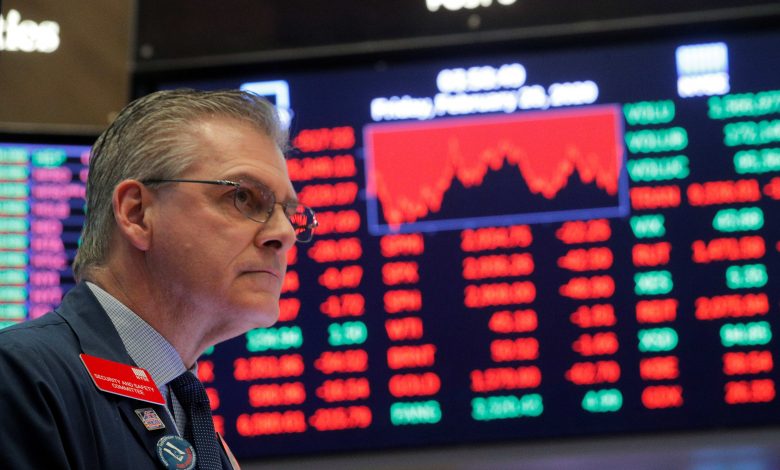Here’s why financial markets are tanking

[ad_1]
Markets around the world are nosediving on Monday owing to a combination of plummeting oil prices and a surge in global coronavirus cases.
A group of oil-producing nations known OPEC failed to reach a deal with its allies over oil output cuts following a meeting in Vienna on Friday. This led OPEC kingpin Saudi Arabia to slash its official selling prices for April and reportedly prepare for an increase in production.
The shocking move came after OPEC ally Russia rejected the 14-member organization’s recommended production cuts of 1.5 million barrels per day from April until the end of the year in a bid to support energy prices, which along with global stock markets have been ravaged by falling demand amid the coronavirus outbreak.
The Kremlin’s decision not to help prop up energy prices not only shattered the coalition efforts to curb production, but will also likely impact U.S. shale oil producers.
“If you look at Russia, they do not consider indefinite production cuts to be a viable strategy for their oil industry, I think they need to see a structural shift in the supply side, that is the only way you move beyond this era of cuts, and U.S. shale, I would say, is firmly in the crosshairs,” Thom Payne, head of offshore, rigs and wells at Westwood Global Energy Group, told CNBC’s “Street Signs Asia” on Monday.
Payne added that Russia “smells blood” in the weak U.S. shale sector and would be looking to shave 1.5 to 2 million barrels a day off U.S. shale production, which has increased sharply in recent years.
Fears that the decision will instigate an all-out price war between OPEC and Russia sent oil prices plunging by more than 25% late on Sunday evening.
Meanwhile, cases of the new coronavirus worldwide now total 109,343, according to the latest World Health Organization figures, with 3,809 deaths.
In Italy, deaths from the outbreak spiked from 233 to 366 over the weekend, an increase of 57%, while confirmed cases jumped 25% to 7,375. Inclines in confirmed cases have also emerged in the U.K. and France.
By the market close in Asia Pacific, Japan’s Nikkei 225 and Topix indexes fell by more than 5%, Hong Kong’s Hang Seng was down 4.23% and mainland Chinese stocks declined by more than 3%, while Australia’s S&P/ASX 200 plunged 7.33%
European stocks also tanked at the start of trading Monday, with the pan-European Stoxx 600 tumbling 6% to enter bear market territory. Italy’s FTSE MIB dropped 9.5% to lead losses in the region while Britain’s FTSE 100, Germany’s DAX and the French CAC 40 each shed around 6%.
Stateside, futures on the Dow Jones industrial average plummeted more than 1,200 points, indicating a hammering for equities when Wall Street begins trading later in the day.
Spooked investors have flocked to traditional safe haven assets such as bonds, sending the yield on U.S. benchmark 10-year Treasury note to a staggering all-time low of below 0.34% for a brief period on Monday morning, while the 30-year Treasury bond yield tumbled below 0.74%. Yields made a slight recovery by mid-morning but were still hovering near their historic lows.
Recession not depression
While comparisons are being drawn to the 2008 financial crisis, Neil Shearing, chief economist at Capital Economics, highlighted that while 2008 was what economists term a “balance sheet” recession which impacted aggregate demand, the current economic shock resulting from the coronavirus affects both the supply and demand side of the economy.
“Factory shutdowns, travel bans, supply-chain disruptions and school closures represent a supply shock — the ability of the economy to produce goods and services is diminished,” Shearing said in a note Monday.
“But fewer trips to shops, restaurants and cinemas represent a demand shock — consumer spending falls. Large falls in the stock market also feed into weaker demand by reducing household wealth.”
Shearing suggested that the worst-case scenario at present is very different from 2008, when asset price collapses were magnified by high levels of leverage and vulnerabilities in the global financial system.
“Pockets of risk exist — particularly in the corporate sector — and some of these vulnerabilities in the energy sector may be exposed by the sharp drop in oil prices over the past day. But we don’t think these are large enough (yet) to trigger a global crisis,” he said.
“All of this means that the most likely worst-case scenario today is a sharp but probably short recession rather than an outright depression.”
Source link






